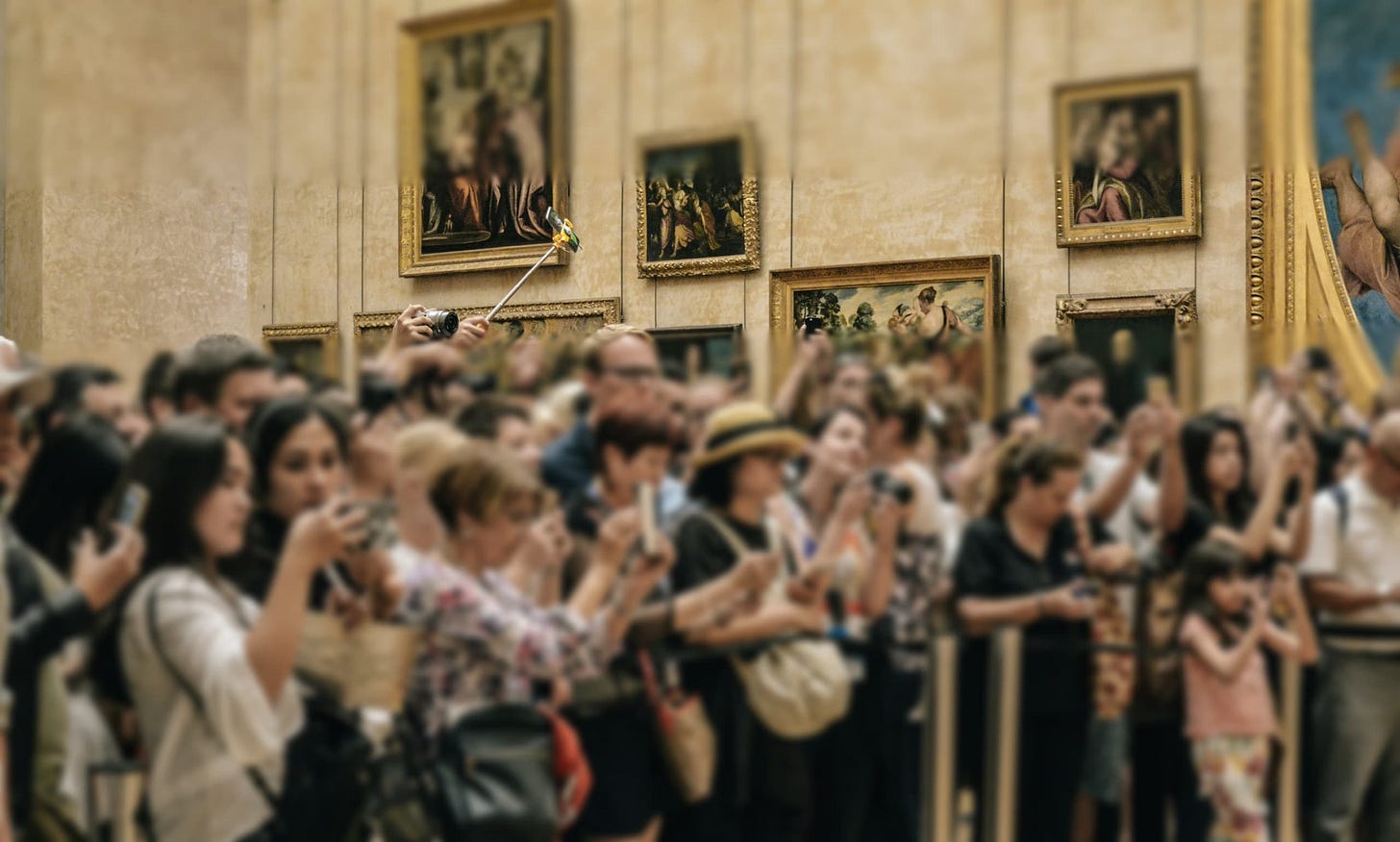My Love-Hate Relationship With Fame
The Lies, Risks, and the Price Tag of Fame
In the age of social media, attention often goes to those who are the loudest, not necessarily the most insightful. The quiet brilliance of many is often overshadowed by viral sensationalism. Take Mr. Beast, for instance. He consistently pushes the boundaries of his videos to the extremes. This not only keeps his audience at the edge of their seats, but also leaves them eagerly anticipating his next videos. If you want to go viral on TikTok, all you need to do is come up with an extreme challenge, like drinking water from your toilet. Want to get likes on X? Post an outrageous tweet that provokes both the Left and the Right.
The world is turning into a game of extremes. Social media is so saturated with triviality that it overwhelmingly noisy. The only way to stand out is to outdo already extreme content with even more extremes. When you look at your favorite creators, you’d notice how the content of many has changed in the past few years. This is especially true for entertaining content where outrageous pranks, reckless destruction, or extreme survival stunts often make it to the top of the trending list. This sets up a bad example for new creators to follow. News outlets, movies, newspapers, or any other forms of media have shifted towards the extremes in one form or the other. Cal Newport puts it beautifully in his blog post by likening today’s media to ultra-processed foods.
How Much of It Is Real?
People used to be famous for their inventions, discoveries, art, skills, and the value they brought to the society. Doctors, engineers, musicians, painters, professors were once the pillars of fame—admired and respected. Throughout history, if we look at the number of people who showed up at a guest lecture by famous scientists visiting a foreign country briefly, we’d be surprised at the people we’ve come to value today. The definition of fame has evolved since then. We have a new kind of fame today, one where people are famous merely by the number of followers they have on Instagram. People who don’t necessarily add value to the lives of other people are famous purely for the lifestyle they portray. There are numerous YouTube videos where a creator tries to make themselves—or a stranger—go viral. It shows you the ins and outs of what goes into “manufacturing” fame. You want to post a picture of flying private? No worries. There’s a mock-up studio of a private jet that you can rent to shoot pictures in. Want more engagement? No worries. You can buy likes. Don’t want to go through the hassle? You can just buy an account with a million followers! Not only does this get you access to exclusive “posh” places, with a little persistence and couple phonecalls, you can score free perks.
Fame is such an obscure, strange thing. You can’t touch it, but it’s more powerful than almost any object on the Earth. You can’t see it, and yet almost everyone wants it. And whoever actually gets it, has absolutely no control over it.
— Fake Famous (Documentary)
Fame has now undergone an even more radical transformation. Now, people are so desperate to stand out that they film themselves committing crimes or harassing people in the hopes of becoming famous. On social media, men who flaunt wealth get attention, while women who are bold garner likes. The incentives are skewed, shaping what people think they need to do to stay relevant. The race is on and people will do anything to win fame. This is the real-life Squid Game.
Around Covid lockdown, the desire to get famous was at its zenith with TikTok challenges making people famous left and right. People were cooking their chicken in NyQuil, shampooing their hair with superglue, dancing beside moving cars with the doors open, etc. In fact, the challenges often resulted in countless injuries and TikTok had to issue a disclaimer under such videos stating, “Participating in this activity could result in you or others around you getting hurt.”
The lengths people go to for fame is bonkers! We have challenges like licking toilet seats, peeing your pants, and choking yourself until you pass out, just to name a few. One 10-year-old girl in Italy trying the blackout challenge tied a belt around her neck and accidentally asphyxiated herself. She was rushed to a hospital in Palermo where doctors ultimately pronounced her brain-dead. Reading about and watching some of these attempts at fame sends shivers down my spine. If you are interested in more, you can read about other brutal TikTok challenges here. I felt that the world is truly a hopeless place when writing these lines.
I think everybody should get rich and famous and do everything they ever dreamed of so they can see that that’s not the answer.
— Jim Carrey, Actor
I recently came across this amazing insight by Chris Williamson in his newsletter that is along the same lines as Jim Carrey said. “Why the hell do we care about fame so much even when we know it is not as good as it seems? Stalkers, threats, lack of privacy, scrutiny, you name it all.”
Tim Ferriss talks about his journey through fame here. It’s a great masterclass on fame, I would say.
It is a Skewed Game!
Have you ever heard of the winner-take-all or 80-20 rule? If you haven’t, allow me to explain. Assume you are a gambler sitting in some casino in Las Vegas. You play your cards well and win big! Now, do you win all the money on the table or do you split the win with the others? You keep everything because the winner takes all, duh! There is only one place for the winner and a large cemetery for everyone else. The game is skewed such that one person can dominate the entire field while the others are left looking for scraps. More commonly, this is known as the 80-20 rule, which suggests that 20% of X leads to 80% of Y. While there is a fair bit of nuance to this, as a dirty heurestic, it makes sense.
The top 20% of people own 80% of the wealth.
The top 20% of companies bring in 80% of the revenue in stock markets.
The top 20% of diseases are responsible for 80% of fatalities.
The top 20% of Netflix’s shows make up 80% of their revenue. The list goes on.
Likewise, on social media, 20% of creators capture 80% of the audience, leaving the rest to compete against well-funded, highly marketed celebrities. It is becoming increasingly impossible to be famous for hard-earned skills. When you lived in tribes of few, you were the only blacksmith people knew. If anyone needed anything, they would come to you. You rarely had to compete against the skills of another blacksmith in a far-away tribe. Today, the world has become a single large tribe where you compete against millions of the likes of you. Do you think you can keep up? Even if you were a world-class blacksmith, someone far less skilled could outshine you—just because they blow fire or juggle swords like a flair bartender. Real skills do not translate well over a smartphone screen. Showmanship and aesthetics are much more pronounced in the digital world. Maybe you could outshine your rival by quenching your swords in toilet water—because apparently, that’s the new formula for fame.
Final Thoughts
We are gambling our time, efforts, and in some cases, our lives to achieve fame. The fame game is rigged now more than ever. Most of it is artificial, manufactured, deceptive, and insincere. Anyone can buy their way to fame by the number it shows on their social media account. It is necessary that we chase self-expression and do the things we like without obsessing over the number of people who find it amusing online.
“Oh are you a saint who doesn’t want fame?” I do. Just like the rest of us, I like fame too. Holding such a powerful influence over others and in large numbers is something every one of us innately desires. However, I want my influence to be a source of good. I aspire for fame in the old academic sense discussed before, one where I am respected and admired for the knowledge and insights I have. I do not wish for fame for its own sake. I despise the fame that comes from doing stupid challenges, harming someone, or by the follower count on my social media profiles. We have strayed away from admiring scholars, scientists, doctors, engineers, and leaders. While striving for fame isn’t the noblest cause, aspiring for a meaningful and positive influence is.
Fame, when earned through real skill and contribution, is a force for good. But chasing it for its own sake leads to desperation and deceit. The choice is ours: will we seek meaningful impact or become pawns in the social media fame game?
Who will you be?
Suggested Reads:



